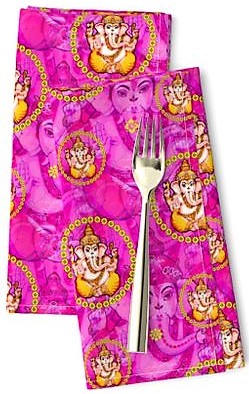Madhu Patel
CHICAGO: A Durham (North Carolina) headquartered “world’s largest custom fabric, wallpaper and home decor digital marketplace,” Spoonflower’s CEO has assured removing napkins carrying images of various Hindu deities following strong protest from a large group of Indian Americans in the country.
Spoonflower CEO Michael Jones, in a statement posted on company website and sent to Rajan Zed, who spearheaded the protest, wrote:… “we are newly informed that the display of Hindu deity imagery on some of our dining products is unsuitable within Hindu religion tenets…We apologize to the Hindu community for the inadvertent misuse of this imagery… Among the actions we will take is in removing Hindu deity designs from Spoonflower.com home decor, and its home decor marketplaces…we always want to appropriately respond when we are fortunate enough to learn that we sometimes don’t know what we don’t know. We humbly acknowledge that fact.”
Rajan is President of Universal Society of Hinduism and he thanked Spoonflower and Jones for quick action and understanding the concerns of Hindu community, which thought that placing images of Hindu gods and goddesses on napkins was insensitive and disquieting.
Hindu deities (Shiva, Krishna, Lakshmi, Ganesh, Murugan, Kali, Hanuman, etc.) are meant to be worshipped in temples or home shrines and not for wiping mouth/fingers, catching crumbs, blowing nose, containing coughs/sneezes, throwing on dirty plate, covering lap, etc. Inappropriate usage of sacred Hindu deities or concepts or symbols or icons for commercial or other agenda was not okay as it hurt the devotees, Rajan argued.
“Global marketplace” like Spoonflower should not be in the business of religious appropriation, sacrilege, and ridiculing entire communities. It was deeply trivializing of immensely venerated Hindu gods and goddesses like Shiva, Krishna, Lakshmi, Ganesh, Murugan, Kali, Hanuman, etc., to be displayed on napkins; Rajan Zed had emphasized.
Spoonflower, reportedly established in 2008 and with offices in Durham and Berlin (Germany), claims to be “a global marketplace connecting makers and consumers with artists worldwide”.







